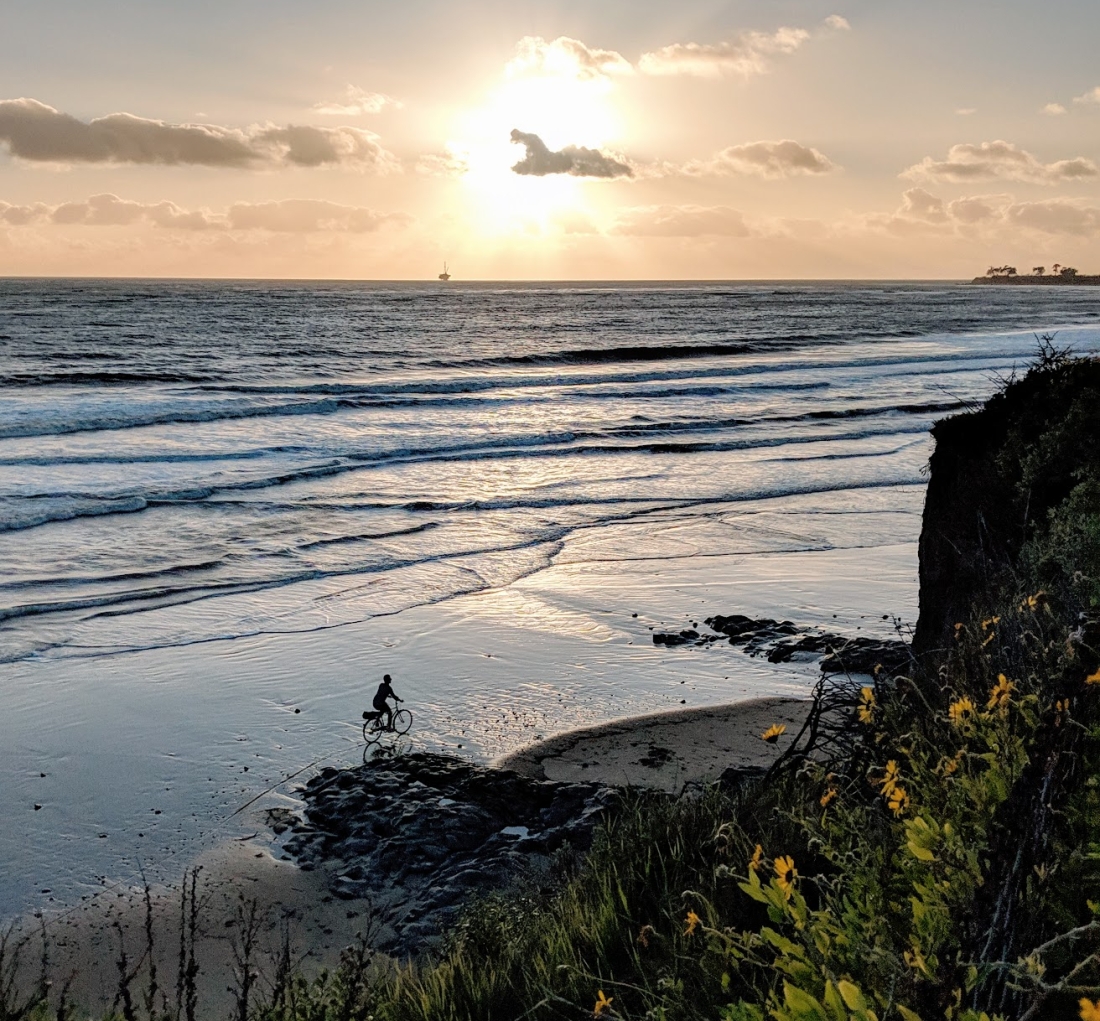8 minute read. Cover image taken at Santa Barbara, CA.
This year in May I got into a serious bike accident. I went over the handlebars and blacked out. Fortunately, my girlfriend was there and called an ambulance. I regained consciousness in the hospital a few hours later, scraped, bruised, concussed, and groggy from the painkillers.
The doctor walked in and said, “Good thing you wore your helmet.” My CT scan and MRI wouldn’t have been as clean otherwise.
Their prescription was ample rest and no physical activity (along with some painkillers). Resting was easy — anything more than limping across a room was a herculean task. Breaking my fall with my hands meant that I could barely grip my eating utensils, twist a doorknob, or type on a keyboard.
So I often took to the living room sofa (ah yes, my safe space — no nasty chopsticks or doorknobs to grapple with there), and spent a lot of time sitting and thinking.
Reflections
My first thought was that I was so stupid for getting into that accident. The scars on my face and body were constant reminders of that.
But secondly, I felt so grateful to be alive. I felt like I was given another chance.
Otherwise, I wouldn’t be here right now, tip-tapping away at my keyboard. It’s a luxury to be able to walk away from that harrowing experience and still be able to walk, breathe, and enjoy life half a year later.
No one ever told me that death could come so suddenly. Some of us have no experience in approaching the topic. And everyone has their own way of coping with mortality that they internalize for themselves.

That seems ironic to me because if we have one thing in common, it’s death. Shouldn’t this be what unites us? The ultimate equalizer? I wouldn’t mind chatting about dying over Sunday brunch’s eggs and bacon.
Coming face-to-face with death meant that I was forced to acknowledge that I was going to die someday. And in doing so, I realized that the most valuable resources I had were: 1) my time and 2) my health.
The Illusion of Time & Health as Plentiful Resources: Money Doesn’t Mean Anything When You’re Dead
“Nobody on their deathbed has ever said “I wish I had spent more time at the office”.”
Harold Kushner
I knew of someone (let’s call him Tom) who was ready to retire. Tom was planning to spend his retirement years finally diving into his hobbies, traveling the world, and enjoying time with his family.
A week before his last day at work, he died in his sleep. He was in his 60’s.
That story crushed me. I’m sure he was able to enjoy life leading up ’til then, but I can’t help but imagine how much he was looking forward to that glorious “life after retirement.” I wonder if he had delayed his gratification, believing that he had more time ahead of him. He might’ve been thinking, “I can take that trip when I’m finally retired and solidified my nest egg,” while his health deteriorated over time.
I think it’s so interesting when I hear something like, “Oh you’re in your twenties? You’re so young! You have your whole life ahead of you!”
As much as that idea may be true, I believe it fosters a false sense of security. It creates the illusion of time and health as plentiful resources.
According to Data Commons, the average life expectancy is 78 years in the United States. That means by the time we turn 22, we’re already more than a quarter of the way to the casket, not accounting for pre-existing health risk factors or accidental death (I’m looking at you, biking).
We all trade time & health for money, as if we had infinite amounts to spend. It’s like we’re the US Federal Reserve, continuing to print currency to solve for the national debt, ignoring the fact that we’re going to have to own up to that debt someday.
But we have neither infinite time nor infinite health. It took me a huge injury to realize: My time and my health were limited and I needed to take care of them with respect.
I can always make money back. But I will never get my time or my health back; once it’s gone, it’s gone.
What did I do with that realization?
It’s been a good reminder to close my screens, be present, and focus on the things that really matter to me.

On the other hand, it felt fairly neurotic to constantly think about spending my time wisely and squeezing productivity out of every last Pomodoro-interval in my day. It was exhausting to feel guilty about not Carpe-Diem’ing it up when maybe what I really wanted to do was play video games or indulge in yet another recommended YouTube video.
So I would always say that there’s a balance there. I learned that I needed to take time to recharge and take care of myself. My body and my mind demand a balanced lifestyle. But overall I’m happy to have this guiding principle that keeps me focused on the things that fulfill me.
It’s the Little Things In Life: Optimizing for “Long Term Happiness”
The question then became, “What were the things that truly fulfilled me?”
While visualizing my answer, I had flashbacks to sunny picnics on folding chairs, epic expansive views at summit peaks, crowded dinners over home-cooked meals, warm hugs after not meeting for a long time, and meaningful conversations that would stretch into the early dawn.
I couldn’t recall the specifics of those memories, but they all radiated a fuzzy “that was fun” feeling. I found the common threads were that they all 1) involved personal connections, and 2) were experience-based. Some might call them the “little things” in life.
My takeaway? I needed to do things for my “long-term happiness.”
I needed to optimize for those slow-digesting memories that would keep me full and satisfied for years to come, instead of snacking on empty-calorie dopamine hits that would blur the days together.
This near-brush with death also reaffirmed one of my lasting beliefs: People matter. The amount of time that my path is going to cross with my friends and family is only going to be a fraction of our lifetimes. I needed to be present and deeply cherish our time together, while we’re together.
Practicing Health & Risk Management: Always Wear Your Freaking Helmet
When you think you’re gonna die yesterday, today is sweet.
Buddy Dieker, Ozark
I know of someone who was an avid cyclist (let’s name her Dana). Dana joined a cycling group, biked every weekend, and made a lot of her friends that way. She was in the best shape of her life. Until one day this year, she got hit by a truck while biking through an intersection.
Dana survived and is still recovering today. Every day in her physical therapy she’s re-learning how to walk, grip her fingers around a glass of water, and touch her toes.
Humans are so fragile. I learned that first-hand with my trip to the hospital.
I realized I needed to take better care of my body so it could last longer.
I always tell people, “I want to feel 25 when I’m 65.”
And achieving that meant that I needed to start practicing that mantra the day before yesterday.
Feeling young doesn’t mean just being in athletic shape. It also means having a healthy mental immune system. And mental health was something I seriously underestimated.
I realized that if my mental game was weak, I wouldn’t be able to handle hardships and challenges.
I needed to protect my health because at some point, entropy is going to hit in my 40’s and it’s all going to go downhill from there. My body and mind were going to stop taking a charge someday, and those batteries were going to run dry.
Closing Thoughts: Memento Mori
“Memento mori” is something that serves as a warning or reminder of death, such as a skull.
For me, I have scars on my face, fingers, and knees. I see them every time I look in the mirror. And they humble me. They ground me.
They remind me that my most important resources are my time and my health. Because I can’t get them back once they’re spent. They remind me that money doesn’t mean anything if I’m dead.
They remind me to cherish my personal connections and to keep striving for things that add to my “long-term happiness.”
They remind me that life is short, fragile, and temporary. And to always wear my freaking helmet.
